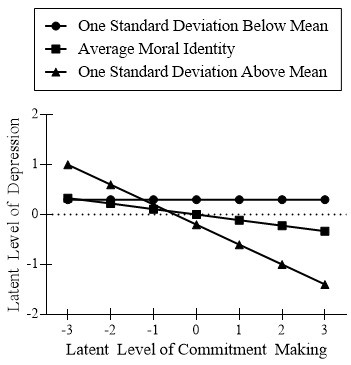P809
Developmentally, humans grapple with the task of forming and committing to individual and social identities. This task continues throughout the lifespan but is a central feature of adolescence and early adulthood. Individuals who have mature, committed identities, compared with individuals who have identity confusion, have been found (via survey data) to have lower rates of mental illness and a greater sense of psychological well-being. Moreover, individuals who have identities with distinct moral components are more pro-social and less antisocial than their peers.
A recent study sought to investigate relationships among various identities, including moral identity, mental health, risky behavior, and overall psychological well-being in a sample of college students. Identity commitment was defined as the extent to which respondents have made commitments to a particular identity as measured by items such as “I know the direction I want to take in life;” higher scores in this metric indicate greater commitment. To measure moral identity, participants were presented with a list of moral qualities and asked if they agreed that being a person who possessed such qualities would make the subject have a feeling of approval; higher scores indicate greater endorsement of morality. A composite index of depression was used with higher scores indicating greater depression. Both identity commitment and moral identity were found to be negatively correlated to depression, anxiety, and hazardous alcohol use and positively related to self-esteem. The figure below shows the depression-commitment interactions at multiple levels of moral identity; the interaction between depression and identity commitment is stronger for higher levels of moral identity.

Figure 1. Interaction plot of link between commitment making and depression at various levels of moral identity.
.
Find an error? Take a screenshot, email it to us at error@mytestingsolution.com, and we’ll send you $3!
